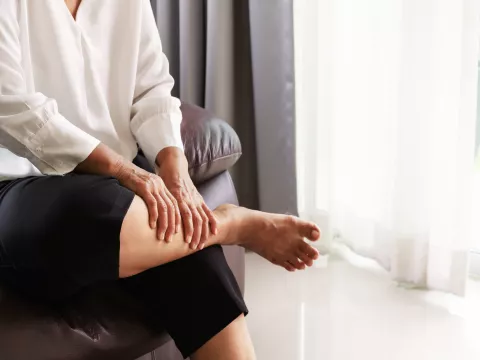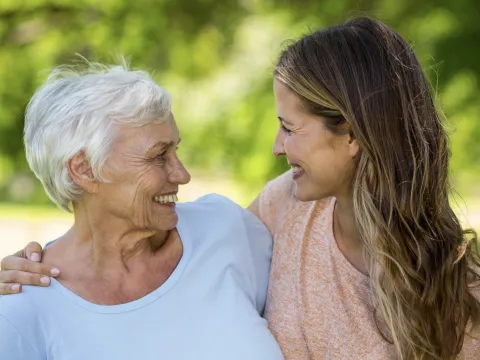- AdventHealth

Choose the health content that’s right for you, and get it delivered right in your inbox.
Varicose veins — bulging and swollen blood vessels you can see and feel just under your skin — are common, especially in older women. While men can have them too, science proves that women are twice as likely.
Varicose veins don’t usually cause any problems beyond being unsightly, but can lead to more serious complications when left untreated.
What Causes Varicose Veins
Blood flows from your heart through your blood vessels, which include large arteries and smaller veins, throughout the body and back again.
Varicose veins usually occur in the calf or thigh, where some blood vessels return blood upward, against gravity, to the heart. Valves in the veins prevent blood from flowing back down while your heart is between beats. If the valves become weak or damaged, downward-flowing blood can collect in parts of the vein, causing it to stretch, twist and swell (becoming varicose).
Varicose veins can also form during pregnancy when extra blood to support your baby puts more pressure on veins, causing them to swell and twist. While these usually shrink or disappear after childbirth, in some instances they may remain or even worsen.
Symptoms of Varicose Veins
Although varicose veins don’t always have symptoms, they can include:
- Aching or throbbing
- Discomfort after sitting or standing for a long time
- Itching, especially near the ankle
Diagnosing Varicose Veins
If you believe you have varicose veins, your doctor will examine your legs while you’re standing and sitting. If other health conditions are suspected, your physician may order imaging tests, such as an ultrasound to check blood flow or a venogram to check for a blood clot.
Risks of Varicose Veins
If not treated, varicose veins can result in more serious conditions, including:
- Painful and hard-to-heal sores or skin ulcers
- Bleeding from the vein
- Deep Vein Thrombosis (DVT)
Of these conditions, DVT is the most serious. If you have DVT, blood clots can form deep within your thigh or lower leg and block your lungs. This is a life-threatening condition.
Varicose Vein Treatment
Depending on your condition, treatment may include lifestyle changes, nonsurgical treatments or surgery.
Lifestyle Changes
While these lifestyle changes can’t prevent or cure varicose veins, they can help relieve your symptoms:
- Don’t stand or sit for long periods without changing position
- Lose weight to improve blood flow and take pressure off your veins
- Walk to increase blood flow and improve your muscle tone
Wearing compression stockings or hose can also prevent veins from expanding, which stops blood from pooling and forcing blood toward your heart. You can buy compression hose with different strengths at specialty stores, pharmacies or online.
Your doctor can also prescribe compression hose if your insurance covers them. You’ll have these custom-fitted by specialists at a medical supply store or at some pharmacies.
Nonsurgical Therapies
Your doctor may recommend nonsurgical procedures to remove or close varicose veins. These include:
- Endovenous laser ablation - heat from a tiny laser is inserted into the vein to shrink it
- Laser treatment – heat applied at the surface of the skin causes the vein to close
- Sclerotherapy - a liquid salt solution, injected into the vein, collapses it
Surgery for Varicose Veins
For severe varicose veins, your doctor may talk with you about whether surgery is your best treatment option. Varicose vein surgeries include:
- Ambulatory phlebectomy removes the varicose veins closest to the skin surface
- Endoscopic vein surgery closes the vein
- Vein stripping and ligation involves removing a section of the vein and sealing the remaining part
Recovery times vary depending on the surgery, but will typically be a few weeks.
Feel Whole
Varicose veins can make you feel self-conscious, and are sometimes harmful. Our experts can help you determine the treatment that’s best for you with therapies to help you feel whole again.
Discover more ways to prevent vascular disease.





